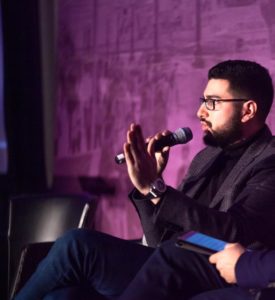Andrew Romans and Hazem Danny Al Nakib are the co-founders of 7BC, a venture capital fund using he power of capital, network and technology to back teams disrupting industries and solving global problems toward a more connected, digitized and automated global economy.

7BC Co-Founder Hazem Danny Al Nakib is based in London.
Welcome to Mob76 Outlook, please tell our readers about 7BC
We were founded for a number of reasons. The first is that although digital transformation and the sharing economy has taken the world by storm over the past 20 years, it has been incredible at sharing, transferring and transmitting data and information, but not at transmitting and transferring value.
The second reason is that without targeted capital investments into innovations at a protocol level, standard, and infrastructure level that really aims at connecting systems, their resiliency, privacy, security, and capabilities and focusing far too much on applications, the entire objective of the model of what economies and industries will look like is ultimately lost.
The third is that we wanted to take a holistic approach across a broad and yet still focused mandate at a technological layer across AI, FinTech and software infrastructure – particularly within the financial sector where it has welcomed, in parts digital transformation, but is nascent when it comes to actual digitalisation where value itself has become digital.
Across all of this, it becomes clear that we are thinking about what global and local economies will turn into and our focus is on what underpins those futures that prioritise security, resilience and optimise efficiencies. We are interested in broader waves effective the use of data, implementations of digital identity, the creation of new asset classes, and the future models of connectivity.

7BC Co-Founder Andrew Romans is based in Silicon Valley.
Why is the fund called 7BC Venture Capital?
Our name 7BC Venture Capital signals our ability to assist and support our portfolio companies on all 7 continents of the world and experience a journey together with our network where after receiving our capital support they will travel the 7 seas and develop their business with our support on a global basis through expansion and growth.
The number seven suggests our international LP base and other business support networks and is also a lucky number which is important at early stage investing and entrepreneurship. BC stands for borderless continents and borderless capital while spanning many different technologies. We believe that AI, FinTech and software infrastructure will collectively usher in a new era for humankind. Our mission is to fund, develop and support the startups that create the foundation of this new era. The right teams, the right technology, the right capital, and the right business model.
Why are you focusing on AI, software infrastructure and FinTech?
There are disparate alternatives of what the future can look like. However, from a trend standpoint, we know that barriers to entry into the financial sector continue to lower as technology innovations come to the market. As such, the financial sector is becoming more integrated with other sectors and industries within the sharing economy, particularly around healthcare, travel, identity, hospitality and much more.
The second is that we view software infrastructure, and other forms of possibly decentralised technologies as the digital underpinning for applications that are built and that use other technologies such as AI, IoT and others to deliver products, services, and value.
There have been barriers to the successful deployment of many of these technologies and often it comes down to where the data is, how is it being collected, and is it being used well in a connected and secure environment, particularly when it is now more valuable than gold. And secondly, whether the digital representations of physical objects are easily stored, transferred, and transacted in a more transparent, disintermediated, and automatic way.
We find that changing the narrative and focusing on building blocks positions us well from a narrative standpoint to build a robust, disruptive and transformational portfolio of companies with both a unique advantage and a unique selling point and differentiator – Where our portfolio companies work together and are complimentary with each other as well. The future is one that will be even more connected, even more automated, and even more digital, that is all we can be certain of.
At what stage of startup investment do you invest?
The majority of our fund is dedicated to series A and growth stage rounds of early stage businesses at the post-product and post-revenue stage where rapid revenue growth, traction, and expansion are the key performance indicators of the business.
However, we do leave some room for a large number of small ticket capital investments at the seed or pre-series A rounds enabling us to double down in future rounds. Our global network of venture partners and ties to universities, incubators and local ambassadors allow us to support the rights teams early on.
Why is 7BC different to the other funds out there?
Every fund can say why they’re different. Most will say it’s their past performance and current network. We can ‘say’ that, but we can also ‘show’ you. We will continue to show you our network and continue to develop it.
In many cases the network is at our 7BC LP investor, team, VC co-investment / syndication and service provider layers, but our favourite is our own current and former portfolio CEOs and founders supporting our evolving global community, and that brings past performance to current and future financial performance.
Any advice to startups when the pitch to you?
Really it always comes down to the basics. If the four biggest factors for success in real estate are location, location, location, the biggest factors for success in our lenses are team, team, team, market, technology, traction and who else is supporting this startup?
Innovations come from having a new technology, at the right time, in the right place with a the right business model. That is what we’re looking for. Where is value not being captured, and where can value be better captured and best delivered?
But with all things, it is a story and depends on the facts of the case at hand – keep it simple, tell your story, have your reason and purpose that drives you and your team, and implement it then demonstrate in your pitch how you’ve been implementing it and what you plan on doing.
Stick to facts and what is there specifically, what you have accomplished and what you will. As long as that can be shown tangibly and clearly, then you’ll attract the right capital, partners, and team members. Sometimes it is a numbers game, sometimes it’s a bit of your gut and vision, but above all it’s a mixture of demonstrating delivery, having laser sharp focus, being consistent, and being surrounded by the best team in an area of the market that you’ve identified is missing or lacking something.
We know that our cash cheque is important, but if we can’t see how we can add value in other ways we don’t invest. This often comes down to our experience, advice and network. We believe that is how all early stage investing should be. Good startups will always attract plenty of funders in any boom or bust economy. The best funders need to demonstrate how they will add value and then deliver that value whilst constantly growing their reputation. It’s that simple. Add value or don’t invest.




